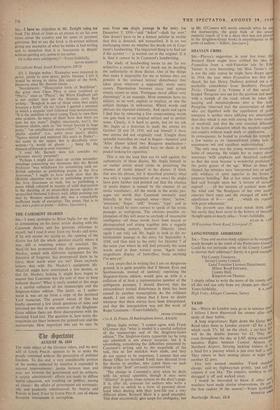SHAVIAN CRIBS
SIR,—Pharos's suggestion, in your last issue, that Bernard Shaw might have cribbed his idea for Pygmalion from a mid-Victorian tale by Ethel Turner, is very interesting; but Miss Turner's salt is not the only source he might hake drawn upon. In 1914, the year when Pygmalion was first p duced, the late Henry Dudeney pointed out a re' markable coincidence from Smollett's Peregrine Pickle. Chapter 2 in Volume 4 of that novel it headed 'Peregrine sets out for the garrison and meets with a nymph of the road, whom he takes into keeping and metamorphoses into a fine lady.
Peregrine 'observed that the conversation of those who are dignified with the appellation of polite
company is neither more edifying nor entertaininl than that which is met with among the lower classes of mankind; and that the only essential difference is the form of education which the meanest capaci0, can acquire without much study or application. . In consequence, he .hoped to produce his nymph a .few weeks as an 'accomplished young lady uncommon wit and excellent understanding.'
The only snag was the young woman's inveterate habit of swearing. He taught her to repeat choitt sentences 'with emphasis and theatrical cadences
so that she soon became 'a wonderful proficient ra the petite graces of the age.' When at times she
slipped, her mistakes were 'interpreted into an agile'
able wildness of spirit superior 'to the forms of common breeding.' But at last when something she
had said brought upon her 'a torrent of sareas le
reproof . . . all her maxims of caution' went with the wind and 'the floodgates of her own natural repartee burst open and she twanged off with the appellation of b— and . . . which she repeated with great vehemence.'
The proverb says that great minds think alik but surely they have never in the history of literati] thought quite so nearly alike.—Yours faithfully, 1A5LLAN M. I Acs0 19 Wavertree Nook Road, Liverpool
it of
c. re














































 Previous page
Previous page